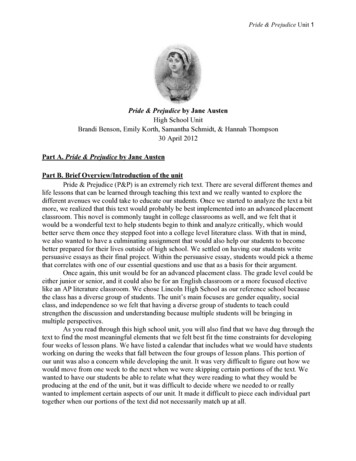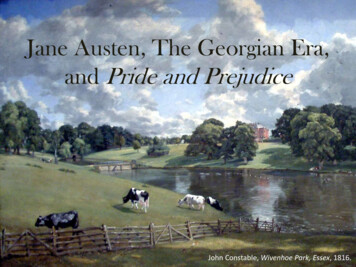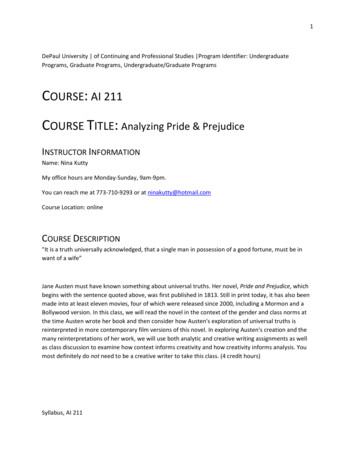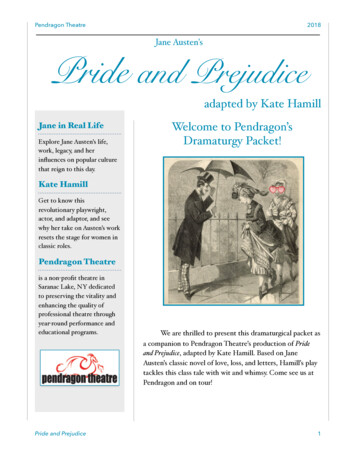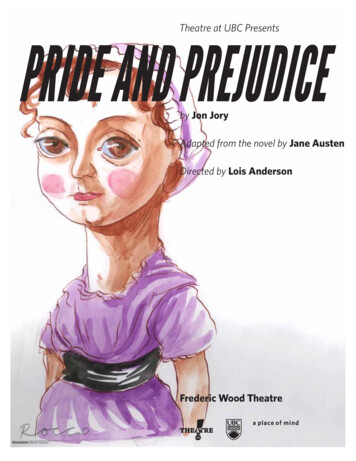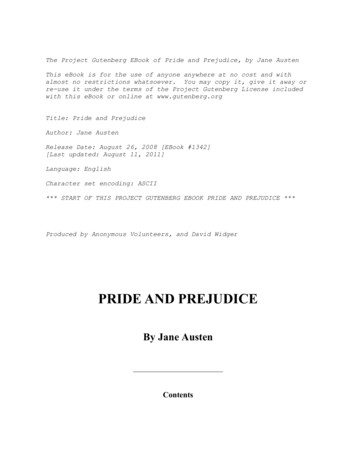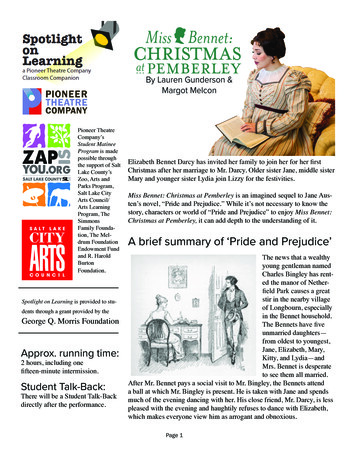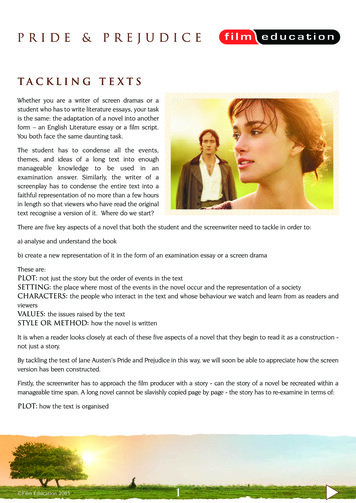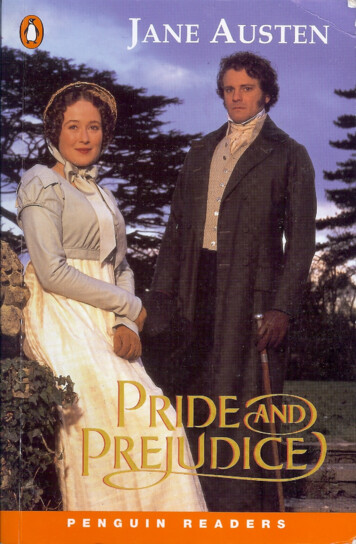
Transcription
Pride and PrejudiceJANE AUSTENLevel 5Retold by Evelyn AttwoodSeries Editors: Andy Hopkins and Jocelyn Potter
ContentsPearson Education LimitedEdinburgh Gate, Harlow,Essex CM20 2JE, Englandand Associated Companies throughout the world.ISBN-13: 978-0-582-41935-3ISBN-10: 0-582-41935-2First published in the Longman Simplified English Series 1945First published in Longman Fiction 1993This adaptation first published in 1996This edition first published 199910pageIntroductionVChapter 1The Bennets1Chapter 2New Neighbours at Netherfield3Chapter 3Jane Gains an Admirer9Chapter 4Mr Collins18Chapter 5Mr Wickham22Chapter 6The Ball at Netherfield27Chapter 7Mr Collins Makes a Proposal of Marriage33Chapter 8Netherfield Is Empty36Chapter 9Mr Collins Makes Another Proposal38NEW EDITIONThis edition copyright Penguin Books Ltd 1999Cover design by Bender Richardson WhiteSet in ll/14pt BemboPrinted in ChinaSWTC/10Chapter 10 Jane Goes to London40All rights reserved; no part of this publication may he reproduced, storedin a retrieval system, or transmitted in any form or by any means,Chapter 11Elizabeth Visits Hunsford43electronic, mechanical, photocopying, recording, or otherwise, without theprior written permission of the Publishers.Chapter 12Lady Catherine de Bourgh46Chapter 13Visitors to Rosings48Chapter 14Mr Darcy53Chapter 15Elizabeth Receives a Letter59Chapter 16Elizabeth and Jane Return Home65Chapter 17The Regiment Leaves Meryton70Chapter 18Pemberley73Chapter 19The Bingleys80Chapter 20Lydia and Wickham84Chapter 21Mr Gardiner Goes to London89Published by Pearson Education Limited in association withPenguin Books Ltd, both companies being subsidiaries of Pearson PlcFor a complete list of titles available in the Penguin Readers series please write to your localPearson Education office or contact: Penguin Readers Marketing Department,Pearson Education, Edinburgh Gate, Harlow, Essex, CM20 2JE.
Chapter 22Mr Bennet Returns93Chapter 23Lydia and Wickham Are Found95Chapter 24Mr Bennet Agrees to Their Marriage99Chapter 25Return to Netherfield106Chapter 26Lady Catherine Visits Longbourn114Chapter 27Elizabeth and Mr Darcy119Chapter 28The End126Activities129IntroductionJane Austen was born in Steventon, Hampshire, in the south ofEngland, in 1775. She was the seventh of eight children ofGeorge Austen, the minister of Steventon Church, and his wifeCassandra Leigh, whose father was also a church minister. Janespent the first 25 years of her life at home in Steventon, whereshe learnt French, Italian, music and needlework. She was taughtby her father, who encouraged her to read widely. The family alsoenjoyed performing plays, and it seems that Jane took part inthese. She began writing at the age of fourteen as entertainmentfor her family.When George Austen left his post in 1801, the family movedto Bath, a city which often features in Jane Austen's stories. Whenhe died four years later, Jane moved back to Hampshire with hermother and sister and lived there until her death at the age offorty-one. The last few years of her life were affected by thedevelopment of the disease from which she died, and thesuffering it caused her.Jane Austen's life was an uneventful one, although some of herrelatives led more exciting lives. She never married; she receivedproposals of marriage, though, and accepted one of them beforechanging her mind the next day. She was very close to her family,and in particular to her sister Cassandra, who also remainedsingle. It seems that this quiet, ordered existence was necessary toJane in order that she could write. She wrote very little whileliving in Bath, which was a relatively unsettled period in her life.The restricted life that Jane Austen led had a strong influenceon the subject matter of her stories, all of which deal with theeveryday lives and concerns of middle-class people living in thecountryside and towns of England. These people are anxious,above all, about their own and others' social position, about affairsv
of the heart and marriage. Austen's particular skill is the carefuland humorous way in which she explores every detail of theirlives. A strong sense of morality underlies her work, which makesit even more powerful. This moral sense is shown throughAusten's description of her characters' behaviour; the writer'sbeliefs are not stated openly.Austen's early writing often made gentle fun of popular fictionof the time. Love and Friendship, her first book (completed in1790), was not very kind to those writers who scornedemotional self-control. Northanger Abbey was written at the sametime, but only appeared after her death. The main character inthis book reads a great deal, and as a result confuses literaturewith real life. Sense and Sensibility was begun in 1797 but did notappear in print until 1811. This book, Pride and Prejudice (1813),Emma (1816) and Persuasion (1817) are Austen's best-knownworks; they all deal in sharply and humorously observed detailwith the manners and morals of one small social group. A moredeeply serious work is Mansfield Park (1814); this has never beenas popular with the reading public as the others, but to many it isthe height of her achievement. Austen's novels were fairlypopular in her lifetime, but it was only after her death that theyachieved great success and that she was really given the respectshe deserved.characters choose their marriage partners, and the mistakes theymake along the way. The underlying message is that it is notenough to marry for money alone; this will lead to unhappiness.Correct and polite behaviour is another important subject, butAusten shows that an honest and honourable nature is moreimportant than social rules which are followed only on thesurface.Mrs Bennet's chief anxiety is her urgent need to find goodhusbands for all five of her daughters. So when a rich, unmarriedyoung man rents a large house in the neighbourhood, herexcitement reaches new heights; she is determined that MrBingley should marry one of the girls. He does in fact seem to beattracted to her oldest daughter, the calm and lovely Jane, buttheir relationship is not in fact an easy one. Mr Bingley has a richfriend named Darcy who begins to admire Jane's lively andamusing sister Elizabeth. On first sight, though, Elizabeth findsMr Darcy much too proud and scornful of the company inwhich he finds himself, and she wants nothing to do with him.Gradually these four young people get to know each other, andthemselves, much better, and they are often surprised by thediscoveries they make.Pride and Prejudice was originally written under the title FirstImpressions. Austen then rewrote the book as Pride and Prejudice,which appeared in 1813 and became probably the most popularof her works. Austen herself loved the book, calling it "my owndarling child", and she was very fond of Elizabeth Bennet, thestory's main character.It was very important at that time for young women of acertain class to marry well, since they had no money or propertyof their own and were completely dependent on their fathersfirst and then on their husbands. The story shows how variousVIvii
Chapter 1The BennetsIt is, of course, generally accepted that a wealthy single man mustbe in search of a wife. As soon as such a man moves into aneighbourhood, each of the families that live there will, withoutany inquiry as to his own feelings on the subject, immediatelyconsider him the rightful property of one of their daughters.'My dear Mr Bennet,' said Mrs Bennet to her husband oneday, 'have you heard that Netherfield Park has been rented atlast?'Mr Bennet replied that he had not.'But it has,' she repeated. 'Mrs Long has just been here, and shetold me all about it.'Mr Bennet made no answer.'Do you not want to know who has taken it?' cried his wifeimpatiently.'You want to tell me, and I have no objection to hearing it.'This was quite enough encouragement.'Well, my dear, Mrs Long says that Netherfield has been takenby a rich young man from the north of England, that he camedown on Monday to see the place and was so pleased with it thathe agreed to take possession immediately, and that some of hisservants are to be in the house by the end of the week.''What is his name?''Bingley.''Is he married or single?''Oh, single, my dear! An unmarried man of large fortune —four or five thousand pounds a year. What a fine thing for ourgirls!''And why is that? What difference does it make to them?''My dear Mr Bennet,' replied his wife, 'how can you be so1
annoying? You must know that I am thinking of his marryingone of them.''Is that his intention in settling here?''Intention? Nonsense, how can you talk like that! But it islikely that he may fall in love with one of them, and thereforeyou must visit him as soon as he comes.''I see no reason for that. You and the girls may go, or, evenbetter, you may send them by themselves, because as you are asgood-looking as any of them, Mr Bingley might like you the bestof the party.''My dear, you praise me too highly. I certainly have had myshare of beauty, but when a woman has five grown-up daughters,she ought to give up thinking of her own appearance. But youmust go and see Mr Bingley when he comes.''I cannot promise to do so.''But consider your daughters. You must go, because it will beimpossible for us to visit him if you do not.''You are too anxious to do what is proper, surely. I dare say MrBingley will be very glad to see you, and I will send him a fewwords by you to inform him of my complete agreement to hismarrying whichever of the girls he chooses, though I must throwin a good word for my little Lizzy.''I hope you will do no such thing. Lizzy is not a bit betterthan the others, but you are always showing a preference for her.''They have none of them much about them to admire,' hereplied. 'They are all silly and empty-headed like other girls, butLizzy is a little more intelligent than her sisters.''Mr Bennet, how can you speak of your own daughters insuch a way? You take pleasure in annoying me. You have no pityon my poor nerves.''You are mistaken, my dear. I have a high respect for yournerves. They are my old friends. I have been listening to news ofthem for the last 20 years.'2'Ah! You do not know how I suffer.'Mr Bennet was such a strange mixture of cleverness, sharphumour, silence and unexpected changes of mind, that theexperience of 23 years had not been long enough to makehis wife understand his character. Her mind was less difficultto understand. She was a foolish woman. When she was anxious,she imagined herself to be ill. The business of her life was toget her daughters married; its pleasure was visiting and news.Chapter 2N e w Neighbours at NetherfieldMr Bennet was among the first of those who visited Mr Bingley.He had always intended to do so, though he continued to let hiswife believe that he would not go. He finally made his intentionsknown in the following way.Watching his second daughter occupied in sewing a colouredband around a hat, he suddenly addressed her with:'I hope Mr Bingley will like it, Lizzy.''We are not in a position to know what Mr Bingley likes,' saidher mother bitterly,'if we are not to visit him.''But you forget, mother,' said Elizabeth, 'that we shall meethim at the public balls, and that Mrs Long has promised tointroduce him.''I do not believe Mrs Long will do any such thing. She hastwo nieces of her own. She is a selfish, insincere woman, and Ihave no opinion of her.''Neither have I,' said Mr Bennet, 'and I am glad to find thatyou do not depend on her serving you.'Mrs Bennet would not make any reply, but, unable to controlher annoyance, began complaining to one of her daughters.'Don't keep coughing so, Kitty! Have a little pity on my poornerves.'3
'Kitty lacks judgment in her coughs,' said her father. 'Shechooses the wrong moment.''I do not cough for my own amusement,' replied Kitty. 'Whenis your next ball to be, Lizzy?''In two weeks from tomorrow.''So it is,' cried her mother,'and Mrs Long does not come backuntil the day before, so it will be impossible for her to introducehim, because she will not know him herself'Then, my dear, you may have the advantage of your friend,and introduce Mr Bingley to her!'Impossible, Mr Bennet, impossible, when I am not acquaintedwith him myself. How can you be so annoying!''Well, if you will not perform this duty, I will do it myself.'The girls looked at their father. Mrs Bennet said: 'Nonsense,nonsense! I am sick of Mr Bingley''I am sorry to hear that, but why did you not tell me sobefore? If I had known it this morning, I certainly would nothave gone to see him. It is very unlucky, but as I have actuallypaid the visit, we cannot escape the acquaintance now.'The astonishment of the ladies was just what he wished, thatof Mrs Bennet being perhaps beyond the rest, though when thefirst excitement was over, she began to say that it was what shehad expected all the time.'How good it was of you! I was sure you loved your girls toowell to neglect such an acquaintance. Well, how pleased I am!And it is such a good joke, too, that you went this morning, andnever said a word about it until now.''Now, Kitty, you may cough as much as you choose,' said MrBennet, as he left the room, having had enough of his wife's talk.'What an excellent father you have, girls,' she said, when thedoor was shut. 'I do not know how you will ever repay him forhis kindness. At our time of life, it is not so pleasant, I can tellyou, to be making new acquaintances every day, but for our dear4daughters we would do anything. Lydia, my love, though you arethe youngest, I dare say Mr Bingley will dance with you at thenext ball.''Oh,' said Lydia confidently,'I am not afraid. Though I am theyoungest, I'm the tallest.'The rest of the evening was spent discussing how soon MrBingley would return Mr Bennet's visit, and deciding when theyshould ask him to dinner.All that Mrs Bennet, together with her five daughters, could askon the subject, was not enough to draw from her husband anysatisfactory description of Mr Bingley. They were forced at last toaccept the second-hand information of their neighbour, LadyLucas. Her report was highly favourable. He was quite young,very good-looking, extremely agreeable, and, in addition to allthis, he planned to be at the next public ball. Nothing could bemore exciting!In a few days Mr Bingley returned Mr Bennet's visit, and satfor about ten minutes with him in the library. He had hoped tosee the young ladies, of whose beauty he had heard a great deal,but he saw only the father. The ladies were more fortunate. Theyhad the advantage of observing, from an upstairs window, that hewore a blue coat and rode a black horse.An invitation to dinner was sent soon after, and Mrs Bennethad already planned the meal that was to show the quality of herhousekeeping, when an answer arrived which changedeverything. Mr Bingley found it necessary to be in London thefollowing day, and was therefore unable to accept the honour oftheir invitation. Mrs Bennet was both disappointed and worried.She began to fear that he might always be flying about from oneplace to another, and never settled in Netherfield as he ought tobe. Lady Lucas quietened her fears a little by spreading the word5
that he had gone to London only to collect a large party for theball, and a report soon followed that Mr Bingley would bringtwelve ladies and seven gentlemen with him. The girls wereunhappy at the thought of such a large number of ladies, butwere comforted to find, when the party entered the ballroom,that it was in fact made up of only five altogether: Mr Bingley, histwo sisters, the husband of the older one, and another youngman.Mr Bingley was good-looking and gentlemanly. His sisterswere fine women dressed in the latest fashions. His sister'shusband, Mr Hurst, simply looked like the gentleman he was, butMr Darcy soon drew the attention of everyone by his fine tallform, noble face, and the report, which was passed round theroom within five minutes of his entrance, that he had an incomeoften thousand pounds a year. He was looked at with admirationfor half the evening, until his manners caused a general disgustwhich ended his popularity.Mr Bingley had soon made himself acquainted with all theimportant people in the room. He danced every dance, was angrythat the ball closed so early, and talked of giving one himself atNetherfield. What a difference between himself and his friend!Mr Darcy danced only once with Mrs Hurst and once with MissBingley, refused to be introduced to any other lady, and spent therest of the evening walking around the room. Mrs Bennet'sdislike of his behaviour was sharpened by his having made one ofher daughters appear neglected.Elizabeth Bennet had been forced, by the small number ofgentlemen, to sit out for two dances, and during part of that timeMr Darcy had been standing near enough for her to hear, againsther will, a conversation between him and Mr Bingley, who leftthe dancing for a few minutes to urge his friend to join in.'Come, Darcy,' he said, 'I hate to see you standing around byyourself like this. You really should be dancing.'6'I certainly shall not. Both your sisters already have partners,and there is not another woman in the room with whom Iwould care to dance.''I would not like to be so difficult to please as you are,' criedBingley. 'I have never met with so many pleasant girls in my life.''You are dancing with the only good-looking one,' said MrDarcy, looking at the oldest Miss Bennet.'Oh, she is the most beautiful creature that I ever saw! Butthere is one of her sisters sitting down just behind you, who isvery attractive and probably very agreeable. Do let me ask mypartner to introduce you.''Which do you mean?' Darcy asked. Turning round, he lookedfor a moment at Elizabeth, until, catching her eye, he lookedaway and coldly said: 'She is fairly pretty, but not good-lookingenough.'He walked off, and Elizabeth remained with no very friendlyfeelings towards him. But she told the story with great spiritamong her friends, because she had a playful nature and a strongsense of humour.The evening on the whole passed off pleasantly for all thefamily. Mrs Bennet had seen her oldest daughter much admiredby the Netherfield party. Mr Bingley had danced with her twice,and she had been an object of attention by his sisters. Jane was asmuch pleased by this as her mother, though in a quieter way.Elizabeth shared Jane's pleasure, as she always did. Lydia and Kittyhad never been without partners, and Mary, the least pretty of thefamily, had heard herself praised to Miss Bingley as a skilledmusician.They returned, therefore, in good spirits to Longbourn, thevillage in Hertfordshire where they lived, and of which they werethe most important family.7
Within a short walk of Longbourn there lived a family withwhom the Bennets were especially friendly. Sir William Lucashad formerly been in trade in the town of Meryton, where hehad made a fairly large fortune and risen to the honour of a titleof rank. This honour had, perhaps, been felt too strongly. It hadgiven him a disgust for his business and for his home in a smallmarket town, and, leaving them both, he had moved with hisfamily to a house about a mile from Meryton, which he calledLucas Lodge. But though proud of his rank, he was friendly andready to help anyone who needed it. Lady Lucas was a very goodkind of woman, not too clever to be a valuable neighbour to MrsBennet. They had several children. The oldest of them, a sensibleyoung woman of about twenty-seven, was Elizabeth's specialfriend.It was a time-honoured tradition for the Misses Lucas and theMisses Bennet to meet and talk after a ball, and so the followingmorning brought the former to Longbourn for that purpose.'You began the evening well, Charlotte,' said Mrs Bennet, withforced politeness, to Miss Lucas. 'You were Mr Bingley's firstchoice.''Yes, but he seemed to like his second better.''Oh, you mean Jane, I suppose, because he danced with hertwice. Certainly that did seem as if he admired her. It does seem asif- but it may not lead to anything, you know.''But Mr Darcy is not so worth listening to as his friend, is he?'said Charlotte. 'Poor Eliza! To be only just fairly pretty!''I hope you will not put it into Lizzy's head to be annoyed byhis rude treatment. He is such a disagreeable man that it wouldbe quite a misfortune to be liked by him. Mrs Long told me lastnight that he sat next to her for half an hour without onceopening his lips.''Are you quite sure, madam? Is there not some mistake?' saidJane. 'I certainly saw Mr Darcy speaking to her.'8Yes, because she finally asked him how he liked Netherfield,and he could not help answering her, but she said he seemed veryangry at being spoken to.''Miss Bingley told me,' said Jane, 'that he never speaks muchexcept among people he knows well. With them he is extremelyagreeable.''I do not believe a word of it, my dear.''I do not mind his not talking to Mrs Long,' said Miss Lucas,'but I wish he had danced with Eliza.''Another time, Lizzy' said her mother,'I would not dance withhim, if I were you.''His pride,' said Miss Lucas, 'does not offend me so much aspride often does, because there is an excuse for it. One cannot besurprised that such a fine young man with family and fortuneshould think highly of himself.''That is very true,' replied Eliza, 'and I could easily forgive hispride, if he had not wounded mine!Chapter 3Jane Gains an A d m i r e rThe ladies of Longbourn soon visited those of Netherfield. Thevisit was formally returned. Miss Bennet's pleasing mannerscontinued to win the approval of Mrs Hurst and Miss Bingley,and though the mother was considered to be unbearable, and theyounger sisters not worth speaking to, a wish was expressed to bebetter acquainted with the two oldest. This attention wasreceived by Jane with the greatest pleasure, but Elizabeth sawpride in their treatment of everybody, even her sister, and couldnot like them. But it was plain that their brother did admire Jane,and Elizabeth observed that Jane was giving way to thepreference which she had begun to feel for him from the first,and was beginning to be very much in love.9
While Elizabeth was watching Mr Bingley's attentions to hersister, she did not realize that she herself was becoming an objectof some interest in the eyes of his friend. Mr Darcy had at firsthardly admitted her to be pretty; he had seen her withoutadmiration at the ball, and when they next met, he looked at heronly to criticize. But he had no sooner decided that no singlepart of her face was particularly attractive than he began to findthat the whole was made uncommonly intelligent by thebeautiful expression of her dark eyes. She was completelyunconscious of this. To her, he was only the man who had madehimself agreeable nowhere, and who had not thought herattractive enough to dance with.'You are such an excellent dancer, Miss Eliza, that it is cruel torefuse me the happiness of seeing you, and though this gentlemandislikes the amusement in general, he can have no objection, I amsure, to doing us this honour for one half-hour.''Mr Darcy is all politeness,' said Elizabeth smiling. She turnedaway. Her refusal had not harmed her in the gentleman's opinion,and he thought of her with some admiration. He began to wish to know her better.One day, a large party was amusing itself at Sir William Lucas's.A number of young ladies, and two or three army officers, wereoccupied in dancing at one end of the room. Mr Darcy stoodnear them, and Sir William was trying to make conversation withhim. As Elizabeth moved towards them at this moment, SirWilliam was struck with the idea of doing the polite thing, andcalled out to her:'My dear Miss Eliza, why are you not dancing? Mr Darcy, youmust allow me to present this young lady to you as a verydesirable partner. You cannot refuse to dance, I am sure, when somuch beauty is in front of you.' And, taking her hand, he wouldhave given it to Mr Darcy, who, though extremely surprised, wasnot unwilling to receive it, when she immediately pulled away,and said in some confusion to Sir William:'Sir, I have not the least intention of dancing. Please do notsuppose that I moved this way in order to beg for a partner.'Mr Darcy, with great politeness, requested to be allowed thehonour of her hand, but without success. Elizabeth wasdetermined, and Sir William's attempt at persuasion met with nosuccess.The village of Longbourn was only one mile from the town ofMeryton - a most convenient distance for the young ladies, whousually went there three or four times a week to make a visit toan aunt, Mrs Philips, who was married to a lawyer, and to look ata hat shop just over the way. The two youngest of the family,Catherine and Lydia, were particularly frequent in theseattentions. They always managed to learn some news, and atpresent they were well supplied by the arrival of a regiment inthe neighbourhood, which would remain for the whole winter.They could talk of nothing but officers.After listening one morning to their excited remarks on thissubject, Mr Bennet sharply observed:'From all that I can understand from your manner of talking,you must be two of the silliest girls in the country.'Kitty was a little ashamed, and did not answer, but Lydialaughed loudly.'I am astonished, my dear,' said Mrs Bennet, 'that you shouldbe so ready to think your own children silly. As a matter of fact,they are all very clever.''This is the only point on which we do not agree.'Mrs Bennet was prevented from replying by the entrance of aservant with a note for Miss Bennet. It came from Netherfield.Mrs Bennet's eyes brightened with pleasure, and she called outeagerly, while her daughter read:1011
'Well, Jane, who is it from? What is it about? What does he say?Well, Jane, hurry up and tell us.''It is from Miss Bingley,' said Jane, and then read it aloud:'Having dinner out,' said Mrs Bennet, 'that is very unlucky.''Can I have the carriage?' asked Jane.'No, my dear, you had better go on horseback, because itseems likely to rain and then you must stay all night.''That would be a good idea,' said Elizabeth, 'if you were surethat they would not offer to send her home.''Oh, but the gentlemen will have used Mr Bingley's carriageto go to Meryton.''I would much rather go in the carriage,' repeated Jane.'But, my dear, your father does not have enough horses. Theyare wanted on the farm.'Jane was therefore forced to go on horseback, and her motherfollowed her to the door with many cheerful wishes for badweather. Her hopes were answered. Jane had not been gone longbefore it rained hard. Her sisters were anxious for her, but hermother was pleased. The rain continued the whole evening. Janecertainly could not come back.'This was a good idea of mine!' said Mrs Bennet.Breakfast was hardly over next morning when a servant fromNetherfield brought a note for Elizabeth from Jane to say that shewas unwell.'Well, my dear,' said Mr Bennet, when Elizabeth had read thenote out loud,'if your daughter should have a dangerous attack ofillness - if she should die — it will be a comfort to know that itwas all the result of going after Mr Bingley, and following yourorders.''Oh, I am not afraid of her dying. People do not die of littlethings like colds. They will take good care of her.'Elizabeth, feeling really anxious, decided to go to her sister.The carriage was not available, and as she did not ride a horse,walking was her only possible way.'How can you be so silly,' said her mother, 'in all this mud! Youwill not be fit to be seen when you get there.''I shall be very fit to see Jane, which is all I want.''We will go as far as Meryton with you,' offered Lydia andKitty. Elizabeth accepted their company, and the three youngladies set off together.At Meryton they parted, and Elizabeth continued her walkalone, crossing field after field impatiently, and finding herself atlast within sight of the house, with tired feet, dirty shoes, and aface bright with the warmth of exercise.Her appearance caused a great deal of surprise. Elizabethguessed that Mrs Hurst and Miss Bingley were scornful that sheshould walk 3 miles so early and in such weather. She wasreceived, though, very politely, and in their brother's manner wassomething better than politeness - kindness and pleasure. MrDarcy said very little. He was occupied with admiring thebrightness that exercise had added to the colour in her face.Her sister Jane had hardly slept at all, and was feverish. Thedoctor came, advised her to return to bed, and promised somemedicine. The fever increased, and her head ached badly.Elizabeth stayed with her until three o'clock, and then felt she1213NETHERFIELD PARK10th OctoberMy dear Jane,Will you be so kind as to come to dinner today with Louisaand me? We are all alone. Come as soon as you can on receivingthis. My brother and the gentlemen are to have dinner with theofficers.Yours ever,CAROLINE BINGLEY.
must go. But Jane showed such disappointment at parting fromher that Miss Bingley was forced to invite her to remain atNetherfield for the present, and Elizabeth thankfully acceptedthis offer. A servant was sent to Longbourn to tell the family ofher stay and to bring back a supply of clothes. At half past six, Elizabeth was called to dinner. Jane was not at allbetter. Mr Bingley's sisters, on hearing this, repeated three or fourtimes how sorry they were, how unpleasant it was to have a badcold, and how very much they disliked being ill themselves, andthen thought no more of the matter. Their lack of real feelingtowards Jane, when she was not actually in their presence,brought back to Elizabeth all her original dislike of them.Their brother was in fact the only one whose anxiety for Janeseemed sincere. His attentions to Elizabeth herself were mostpleasing, and they prevented her from feeling herself such anunwelcome guest as she believed she was considered to be by theothers.When dinner was over, she returned direc
Pride and Prejudice was originally written under the title First Impressions. Austen then rewrote the book as Pride and Prejudice, which appeared in 1813 and became probably the most popular of her works. Austen herself loved the book, calling it "my own darling child", and she was very fond of Elizabeth Bennet, the story's main character.
